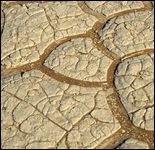Current Features
Climate Change and Health


Changes in climate can affect human health. To draw attention to the connection between global climate change and health, the World Health Organization chose global climate change as the theme of World Health Day 2008 (April 7), and the American Public Health Association chose it as the theme of National Public Health Week (April 7-13, 2008). Many scientists and experts are studying how global climate change will affect the environment. Efforts at the Centers for Disease Control and Prevention (CDC) are focused on addressing how environmental changes can affect people's health.
Consensus exists among scientists all over the globe that the world's climate is changing and that these changes can affect human health. The more direct health effects of climate change can include injuries and illnesses from severe weather, floods, and heat exposure; increases in disease caused by allergies, respiratory problems, and illnesses carried by insects or in water; and threats to the safety and availability of our food and water supplies. Less direct effects can include worry, depression, and the negative impacts of mass migration and regional conflicts.
Addressing the health effects of global climate change is a pressing challenge for CDC and other public health agencies. The problem is broad and complex. Nevertheless, the same framework used to determine the response to other public health challenges can be used to respond to the challenges of global climate change. That framework, developed years ago by the American Public Health Association and a group of federal, state, and local agencies and partners including CDC, outlines ten essential public health services to be used to anticipate, manage, and remedy the problems that can result from climate change:

1. Monitor the health status of the community.
2. Investigate and diagnose health problems and hazards.
3. Inform and educate people regarding health issues.
4. Mobilize partnerships to solve community problems.
5. Support policies and plans to achieve health goals.
6. Enforce laws and regulations to protect health and safety.
7. Link people to needed personal health services.
8. Ensure a skilled, competent public health workforce.
9. Evaluate effectiveness, accessibility, and quality of health services.
10. Research and apply innovative solutions.
The ten essential public health services are key to preventing injuries and illnesses, enhancing public health preparedness, and reducing the risk from climate change. Many actions addressing climate change yield co-benefits for both the environment and health. For example, well-designed, walkable communities not only reduce carbon dioxide emissions but also reduce vehicular air pollution and promote physical activity. CDC is dedicated to addressing any threats to our health that climate change may bring.
For more information
- Climate Change and Health
- Protecting Health from Climate Change: World Health Day 2008*
- Marketing Health and Climate Change Messages to your Audiences
 10:14 min
10:14 min
This podcast informs public health partners about strategies to market health and climate change messages to multi-sector audiences.
- Climate Change: Science, Health and the Environment
 8:44 min
8:44 min
This podcast discusses the science of climate change, the potential for shifts in the natural world to affect our wellbeing, and the challenges of emerging issues in environmental health. - Global Climate Change
 2:01 min
2:01 min
This podcast highlights CDC observations on global climate change and identifies priority areas for future projects.
Page last updated: April 8, 2007
Content source: National Center for Environmental Health
Content owner: National Center for Health Marketing
URL for this page: www.cdc.gov/Features/ChangingClimate
*Links to non-federal organizations are provided solely as a service to our users. These links do not constitute an endorsement of these organizations or their programs by CDC or the federal government, and none should be inferred. CDC is not responsible for the content of the individual organization Web pages found at these links


